This is an archived article that was published on sltrib.com in 2015, and information in the article may be outdated. It is provided only for personal research purposes and may not be reprinted.
Park City • Not surprisingly, Mitt Romney's business friends and political donors were unanimous on whom they would like to see as the Republican Party's presidential nominee in 2016.
But, since Romney has already taken himself out of the race, the competition to tap into his campaign ATM this past week appears to have been won by New Jersey Gov. Chris Christie, who was generating the most buzz in hallway conversations as Romney's E2 Summit drew to a close Saturday.
"People were very impressed yesterday with Chris Christie. They were impressed with Lindsey Graham. Those are examples of two candidates they hadn't seen much of," said Spencer Zwick, Romney's longtime fundraising guru.
In a handful of discussions with attendees — most of them off the record — Christie's name came up time and again as the one who opened eyes and exceeded expectations. Some also praised Graham, Wisconsin Gov. Scott Walker and former Hewlett-Packard CEO Carly Fiorina, who was unknown to many leading up to the gathering.
Christie's address to the gathering Friday predictably touted his accomplishments as governor — taking on the unions, winning handily in a traditionally Democratic state, balancing the budget and getting the economy moving again.
But it was his fiery and impassioned responses during the question-and-answer period that stood out.
The outspoken governor took off the gloves in going after Kentucky Sen. Rand Paul for his opposition to the U.S. surveillance program, which he said "has made America weaker and more vulnerable and he has done it for his own personal political gain and he has done it to raise money."
And he argued the party needs to win the heart of the American people.
"If we do, our ideas have always been better, but we haven't gotten to our ideas often because we haven't won them here," Christie said, pointing to his heart. "We've got to crack our chest open and show them our heart and show them we understand who they are and we understand their anxiety and we understand they've been let down by a government that is so dysfunctional."
Several of the Republican front-runners — including Paul, former Florida Gov. Jeb Bush, and Texas Sen. Ted Cruz — did not attend the event, leaving the six Republican contenders who were on hand — Christie, Graham, Walker, Fiorina, Ohio Gov. John Kasich and Florida Sen. Marco Rubio — to jockey for position.
On Saturday, Fiorina argued the nation needs a president who isn't a career politician and has a background in business and international diplomacy, which she said she brings to the table.
"When we no longer think of ourselves as a nation of limitless possibilities, then we are losing the core of who we are," she said. "There is a deep disquiet in this nation because of it. … We are tangling peoples' lives up in webs of dependence."
Brian Baker, who runs the organization Ending Spending and the Ending Spending Action Fund, a fiscally conservative super PAC, said he was impressed with Walker who "laid out a really compelling vision for America."
Baker's PAC was founded by the Ricketts family, owners of the Chicago Cubs, Ameritrade and others, and Tom Ricketts has already thrown his support behind Walker this year and during union-led attempts to recall the governor.
"Lindsey Graham did a great job. He has a great personal story a lot of people don't know," Baker said. "And of course Governor Christie … presented a really interesting case, heavy on substance and talking about the real challenges facing America."
It is unclear what the benefit will be for any of the attendees. Much of the real work the candidates did occurred in private one-on-one meetings with Romney allies who can not only write jumbo checks, but also bundle contributions to infuse into a campaign.
Walker was said to be most active during the summit, hustling from meeting to meeting, making his pitch that he will "fight and win" the White House for Republicans.
"Some will [open their checkbooks], some won't. Some will commit, some already have," said Zwick. "But by and large, for many people, it's still early."
Graham and Kasich, meantime, used the opportunity to do one interview after another with national media outlets, hoping the exposure boosts them from their position near the bottom of the current crop of contenders.
The candidate message during the E2 Summit also may indicate a pivot in thinking within the Republican Party and a shift in the strategy the contenders believe is needed to win the White House.
Foreign policy was at the forefront for many, especially defeating Islamic terrorism, and President Barack Obama and former Secretary of State Hillary Clinton were hammered repeatedly for, as the GOP candidates put it, making America weaker around the globe.
Nobody was as direct in criticizing the Obama-Clinton foreign policy than Romney, who rattled off 20 catastrophic foreign policy blunders that he said have crippled the United States internationally.
But the candidates also focused on bread-and-butter issues that in 2012 the wealthy Romney was unable to effectively speak to. This crop of aspirants spoke about making college affordable, training workers for better-paying jobs and improving schools.
And each addressed how to reform the immigration system, part of appealing to a Latino voting bloc that is the fastest-growing group and one that has been moving toward the Democratic candidates in recent elections.
"The Republican Party you're seeing here at E2 is very different than the Republican Party of 2012," said Kerry Healey, Romney's lieutenant governor in Massachusetts. "There's a lot of focus on lifting people out of poverty, of expanding the pie rather than dividing the pie, a lot of talk about education and many other issues that were perhaps left at the side in the last election."
Twitter: @RobertGehrke





